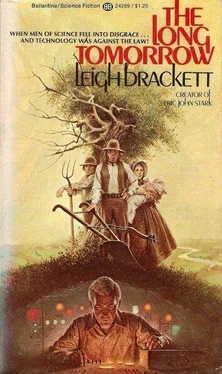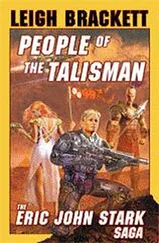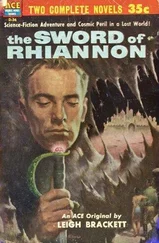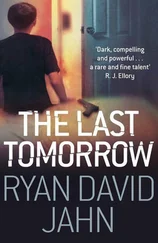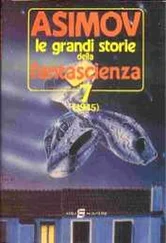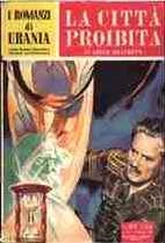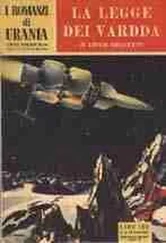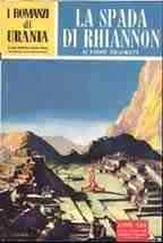“I guess my folks are still out,” she said. “I guess they won’t be back for a while. Do you mind?”
“No,” said Len. “I don’t mind.” He took off his own coat and sat down.
Joan wandered over to the window, slapping vaguely at the flies. She had walked fast all the way, but now she did not seem in any hurry.
“Do you still like working in the Hole?”
“Sure,” said Len warily. “It’s fine.”
Silence.
“Have they found the answer yet?”
“No, but as soon as Erdmann—Now why ask a question like that? You know they haven’t.”
“Has anybody told you how soon they will?”
“You know better than that, too.”
Silence again, and one of the flies lay dead on the floor.
“Almost a hundred years,” she said softly, looking out the window. “It seems such an awful long time. I just don’t know if we can stand it for another hundred.”
She turned around. “I don’t know if Ican stand it for another one.”
Len got up, not looking straight at her. “Maybe I better go.”
“Why?”
“Well, your folks aren’t here, and—”
“They’ll be back in time for dinner.”
“But it’s a long time till dinner.”
“Well,” she said, “don’t you want to see what you came for?” She showed him the edges of her teeth, white and laughing. “You wait.”
She ran into the next room and shut the door. Len sat down again. He kept twisting his hands together, and his temples felt hot. He knew the feeling. He had had it before, in the rose arbor, in the judge’s dark garden with Amity. He could hear Joan rummaging around in the room. There was a sound like the lid of a trunk banging against the wall. A long time went by. He wondered what the devil she was doing and listened nervously for footsteps on the porch, knowing all the time that her folks would not be back because if they were going to come she would not be doing this, whatever it was.
The door opened and she came out
She was wearing a red dress. It was faded a little, and there were streaks and creases in it from having been folded away for a long time, but those were unimportant things. It was red. It was made of some soft, shiny, slithery stuff that rustled when she moved, and it came clear down to the floor, hiding her feet, but that was about all it hid. It fitted tight around her waist and hips and outlined her thighs when she walked forward, and above the waist there wasn’t very much at all. She held out her arms at the sides and turned around slowly. Her back and shoulders were bare, white and gleaming in the sunlight that fell through the window, and her breasts were sharply outlined in the red cloth, showing above it in two half-moon curves, and her black hair fell down dark and glossy over her white skin.
“It belonged to my great-grandmother. Do you like it?”
Len said, “Christ.” He stared and stared, and his face was almost as red as the dress. “It’s the most indecent thing I ever saw.”
“I know,” she said, “but isn’t it beautiful?” She ran her hands slowly down her front and out across the skirt, savoring the rustle, the softness. “This was real vanity, real luxury. Listen, how it whispers. What do you think that dirty old fool would say if he could see it?”
She was quite close to him now. He could see the fine white texture of her shoulders and the way her breasts rose and fell when she breathed, with the bright red cloth pressing them tight. She was smiling. He realized suddenly that she was handsome, not pretty like Amity had been, but dark-eyed handsome even if she wasn’t very tall. He looked into her eyes and suddenly he realized that shewas there, not just a girl, not just a Joan Wepplo, but herselfand something happened to him inside like when the electric lights came on in the dark tunnel that led to Bartorstown. And this feeling he had never had for Amity.
He reached out and took hold of her and she held up her mouth to him and laughed, a deep throaty little laugh, excited and pleased. A wave of heat swept over Len. The red cloth was silky, soft and rustling under his fingers, stretched tight over the warmth of her body. He put his mouth down over hers and kissed her, and kissed her again, and all by themselves his hands came up onto her bare shoulders and dug hard into the white skin. And this too was not like it had been with Amity.
She pulled away from him. She was not laughing now, and her eyes were as hard and bright as two black stars burning at him.
“Someday,” she said fiercely, “you’ll want a way out of this place, and then you come to me, Len Colter. Then you come, but not before.”
She ran away into the other room again and slammed the door and shot the bolt in its socket, and it was no use trying to get in after her. And when she came out again in her regular clothes, a long time later, her folks were coming up the path and it was as if nothing had been said or done.
But it was Joan, in another place, at another time, who told him about Solution Zero.
Winter came. Fall Creek became an isolated pocket of light and life in a vast emptiness of cold and rock and wind and blizzard snows. The pass was blocked. Nothing would move in or out of the canyon before spring. The snow piled high around the houses and drifted in the lanes, and the mountains were all white, magnificent on a clear day with the sun on them, ghostly in the dusk like the mountains of a dream, but too large and still to have in them any friendliness for man. And the air they breathed down across their icy slopes was bitter as the chill of death.
In Bartorstown there was neither winter not summer, night nor day. The lights burned and the air went hushing through the rock rooms, never altering, never changing. The Power entrapped behind the concrete wall gave of its strength silently, untiring, the deathless heart beating and throbbing in the rock. Above in its chamber the brain slept, Clementine, the foolish name for the hope of the world, while men soothed and healed the frayed wires and the worn-out transistors of her being. And above that, in the monitor room, the eyes watched and the ears listened, on guard against the world. Len worked at his job, and sweated and struggled over the books he was advised to read, and thought how much he was learning and how few other people in the ignorant, fearful, guilt-ridden, sin-stricken world outside would have been able to do what he and Esau had done, and what they would do to make tomorrow different from the terrible yesterday. He wondered why the evil dreams still caught him unawares in the jungles of sleep, and he envied Esau his untroubled nights, but he did not say so. He hardly ever thought any more of the Bartorstown he had spent half his life to find, accepting the reality, and a little more of his youth slipped away from him. He thought about Joan, and tried to stay away from her, and couldn’t. He was afraid of her, but he was even more afraid to admit that he was afraid of her, because then in some obscure way she would have beaten him, she would have proved that he did want to leave Fall Creek and run away from Bartorstown. She was a challenge that he didn’t dare ignore. She was also a girl, and he was crazy about her.
Other people had work to do, too. Hostetter spent long hours with Sherman, doing what it seemed he had come home to do—giving the advice gained from his years of experience on how to make the system of outside trade work smoother and better. He was a different-looking Hostetter these days, with his beard trimmed short and his hair cropped, and the New Mennonite dress laid aside. Len had done this a long time ago, so he could not say why it seemed wrong, but it did. Perhaps it was only because he had grown up with one image of Hostetter firmly fixed in his mind, and it was hard to change it. They still shared the same room, but they each had their own work, and Hostetter had his own friends, and Len’s spare time was pretty much taken up with Joan. After a while he got the feeling that the Wepplos figured they would probably get married any day. It made him feel guilty every time he went there, remembering what Joan had said, but not guilty enough to keep him away.
Читать дальше
